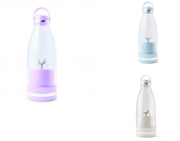Why you might want to stop kissing your dog–experts have issued a serious warning
By
Maan
- Replies 18
What we do for our pets can sometimes come with unexpected consequences, especially when it comes to our health.
A harmless act, often seen as a gesture of affection, has recently raised serious concerns among experts.
As new information emerges, it's becoming clear that the risks may be greater than we ever imagined.
Claudia Winkleman made headlines last week after revealing a shocking habit involving her one-year-old King Spaniel, Skip.
The Traitors host, aged 52, shared that she not only kisses her dog but also opens his mouth to 'insert' her tongue.
While many dog owners might find Winkleman’s actions familiar, experts have raised alarms about the potential health risks associated with kissing pets.
A team of researchers from Penn State warned that household dogs could be 'overlooked spreaders' of zoonotic pathogens, such as antibiotic-resistant Salmonella.
Sophia Kenney, one of the study’s authors, highlighted that while Salmonella is often associated with agriculture, dogs are in close contact with us, unlike cows or poultry.
Kenney pointed out that while people might avoid letting cows sleep in their beds, dogs often share our personal spaces, increasing the risk of infection.
The Penn State researchers discovered that Salmonella, a bacterium that causes food poisoning, could be transmitted from pets to humans.
Symptoms of Salmonella infection include fever, stomach cramps, diarrhoea, and vomiting, and in some cases, it can even be fatal.
The usual source of Salmonella is contaminated food, particularly poultry, but it can also be contracted through contact with pets.
Dogs, cats, and rodents can occasionally carry the bacteria, and reptiles or amphibians are known carriers as well.
The Penn State team analysed Salmonella strains found in domestic dogs between May 2017 and March 2023, matching them to cases in humans.
Their research revealed 77 potential zoonotic cases, with 164 strains of Salmonella identified, supporting the concern that dogs can transmit the bacteria to humans.
While Salmonella infections in dogs are rare, outbreaks have been linked to pet treats, contaminated food, or improper food handling.
The researchers stressed the importance of simple hygiene practices, such as washing hands after touching pets, to prevent the spread of Salmonella.
Nkuchia M'ikanatha, a co-author of the study, said: 'We must respect the enduring threat of Salmonella and remain vigilant in preventing its spread within our families.'
The study served as a timely reminder to avoid kissing pets, as even the healthiest dog could unknowingly carry harmful bacteria.
Vets are now urging pet owners to follow these hygiene measures to protect both their furry friends and themselves.
Here are some tips to help avoid food poisoning:
1. Keep your workspace clean to prevent germs from spreading.
2. Avoid cross-contamination by separating raw meats from ready-to-eat foods.
3. Use a thermometer to ensure food is safely cooked at the right internal temperature.
4. Store food properly, refrigerating perishables within two hours and keeping your fridge at below 40°F.
5. Don't rely solely on expiration dates; use your senses to judge if food is still good.
6. Never thaw frozen food on the counter, as it can cause bacteria to multiply rapidly.
Taking these simple steps can help minimise the risks of Salmonella and other foodborne illnesses.

Have you ever thought twice about kissing your dog after learning this? Let us know your thoughts in the comments.
A harmless act, often seen as a gesture of affection, has recently raised serious concerns among experts.
As new information emerges, it's becoming clear that the risks may be greater than we ever imagined.
Claudia Winkleman made headlines last week after revealing a shocking habit involving her one-year-old King Spaniel, Skip.
The Traitors host, aged 52, shared that she not only kisses her dog but also opens his mouth to 'insert' her tongue.
While many dog owners might find Winkleman’s actions familiar, experts have raised alarms about the potential health risks associated with kissing pets.
A team of researchers from Penn State warned that household dogs could be 'overlooked spreaders' of zoonotic pathogens, such as antibiotic-resistant Salmonella.
Sophia Kenney, one of the study’s authors, highlighted that while Salmonella is often associated with agriculture, dogs are in close contact with us, unlike cows or poultry.
Kenney pointed out that while people might avoid letting cows sleep in their beds, dogs often share our personal spaces, increasing the risk of infection.
The Penn State researchers discovered that Salmonella, a bacterium that causes food poisoning, could be transmitted from pets to humans.
Symptoms of Salmonella infection include fever, stomach cramps, diarrhoea, and vomiting, and in some cases, it can even be fatal.
The usual source of Salmonella is contaminated food, particularly poultry, but it can also be contracted through contact with pets.
Dogs, cats, and rodents can occasionally carry the bacteria, and reptiles or amphibians are known carriers as well.
The Penn State team analysed Salmonella strains found in domestic dogs between May 2017 and March 2023, matching them to cases in humans.
Their research revealed 77 potential zoonotic cases, with 164 strains of Salmonella identified, supporting the concern that dogs can transmit the bacteria to humans.
While Salmonella infections in dogs are rare, outbreaks have been linked to pet treats, contaminated food, or improper food handling.
The researchers stressed the importance of simple hygiene practices, such as washing hands after touching pets, to prevent the spread of Salmonella.
Nkuchia M'ikanatha, a co-author of the study, said: 'We must respect the enduring threat of Salmonella and remain vigilant in preventing its spread within our families.'
The study served as a timely reminder to avoid kissing pets, as even the healthiest dog could unknowingly carry harmful bacteria.
Vets are now urging pet owners to follow these hygiene measures to protect both their furry friends and themselves.
Here are some tips to help avoid food poisoning:
1. Keep your workspace clean to prevent germs from spreading.
2. Avoid cross-contamination by separating raw meats from ready-to-eat foods.
3. Use a thermometer to ensure food is safely cooked at the right internal temperature.
4. Store food properly, refrigerating perishables within two hours and keeping your fridge at below 40°F.
5. Don't rely solely on expiration dates; use your senses to judge if food is still good.
6. Never thaw frozen food on the counter, as it can cause bacteria to multiply rapidly.
Taking these simple steps can help minimise the risks of Salmonella and other foodborne illnesses.
Key Takeaways
- Vets have raised concerns about the health risks associated with kissing dogs.
- Researchers warn that dogs can carry harmful pathogens, such as Salmonella, that can transfer to humans.
- The spread of these bacteria is linked to close contact, highlighting the importance of hygiene practices after interacting with pets.
- Experts advise against kissing dogs and recommend regular handwashing to protect both pets and owners.
Have you ever thought twice about kissing your dog after learning this? Let us know your thoughts in the comments.










